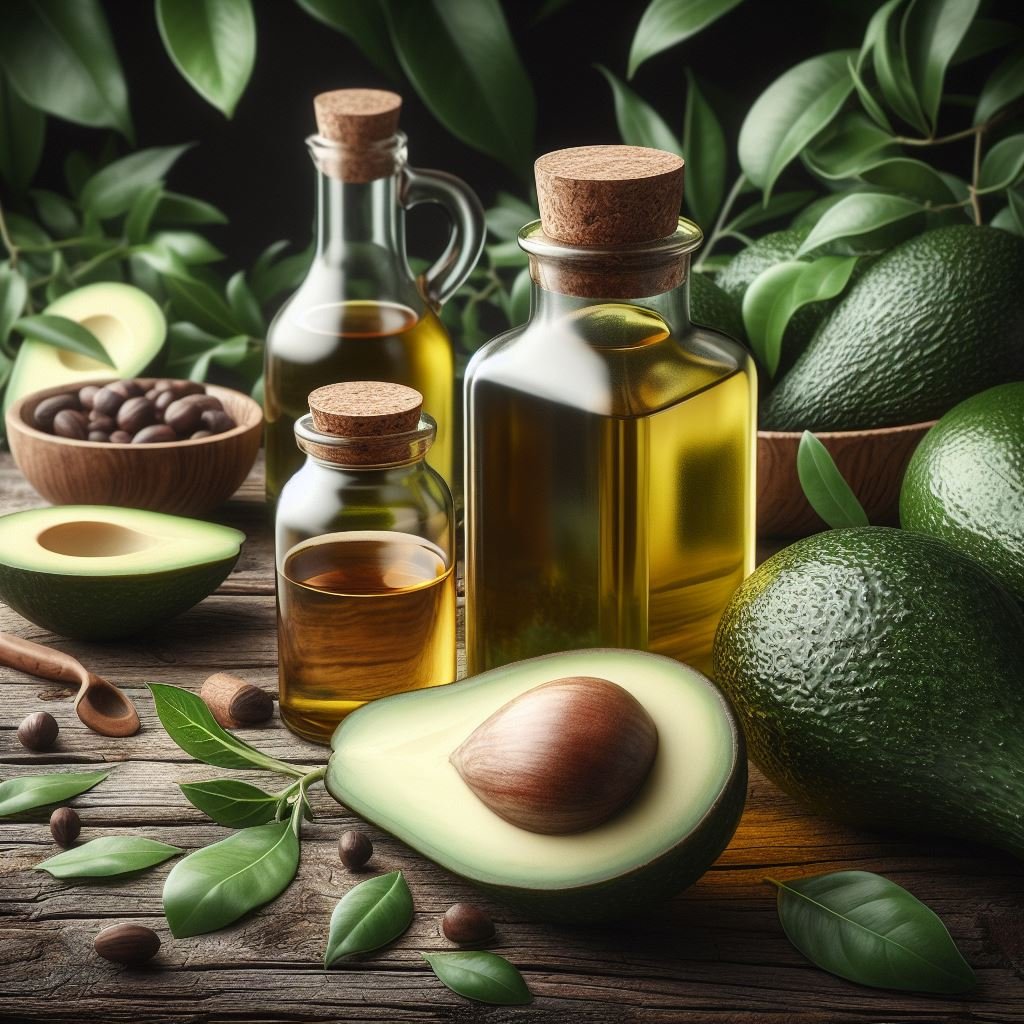Avocado Oil: A Culinary and Healthful Gem
Avocado oil has emerged as a culinary and health enthusiast’s treasure, garnering attention for its unique properties and versatility. This highly nutritious oil, extracted from the pulp of avocados, possesses a remarkable composition, boasting a high smoke point, exceptional stability, and a wealth of beneficial nutrients. Its smooth texture, mild flavor, and resistance to oxidation make it a superb choice for both high-heat cooking and raw applications.
Avocado oil’s nutritional profile is equally impressive, boasting a remarkable concentration of monounsaturated fats, specifically oleic acid, a heart-healthy fatty acid linked to reduced cholesterol levels and improved cardiovascular health. Additionally, avocado oil is a rich source of vitamin E, an antioxidant that protects cells from damage and supports immune function. Its high content of healthy fats and antioxidants contribute to its potential health benefits, including improved skin health, cognitive function, and overall well-being.
History and Origin of Avocado Oil
A Culinary and Healthful Gem: A Journey Through Avocado Oil’s History and Origins
Pre-Columbian Origins: From Mesoamerican Cuisine to Cosmetic Applications
Avocado oil, a culinary and health enthusiast’s treasure, boasts a rich history tracing back to the ancient Mesoamerican civilizations. Archaeological evidence suggests that the avocado, the fruit from which avocado oil is extracted, was cultivated as early as 7,000 BC in present-day Mexico and Central America. The Mesoamericans, including the Aztecs and Mayans, revered the avocado for its nutritional value and versatility, incorporating it into their cuisine and utilizing its oil for medicinal and cosmetic purposes.
Traditional Uses and the Rise of Modern Avocado Oil
Initially, avocado oil was primarily used for cosmetic applications, prized for its moisturizing and conditioning properties. Traditional extraction methods involved laborious processes, often involving hand-pressing or expeller pressing, resulting in a dark, coarse oil. This crude form of avocado oil found its primary use in soaps, lotions, and hair care products.
In the mid-20th century, avocado oil production underwent a significant transformation, driven by the growing demand for high-quality edible oils. New extraction methods, inspired by olive oil production, emerged, allowing for the production of a purer, lighter-colored avocado oil suitable for culinary applications. This refined avocado oil, known as extra virgin avocado oil, gained popularity for its high smoke point, exceptional stability, and unique flavor profile.
Avocado Oil’s Modern Renown: A Culinary and Healthful Staple
Today, avocado oil has become a staple in kitchens worldwide, recognized for its versatility and health benefits. Its smoke point, reaching 520°F (271°C), surpasses that of many other cooking oils, making it ideal for high-heat cooking without compromising flavor or nutrition. Avocado oil’s rich monounsaturated fat content, particularly oleic acid, offers a multitude of health benefits, including reduced cholesterol levels, improved heart health, and enhanced cognitive function. Its high vitamin E content further contributes to its antioxidant potential, promoting skin health and protecting cells from damage.
Botanical Properties of Avocado Plant:
Introduction
The avocado tree (Persea americana), also known as the alligator pear, is a medium-sized evergreen tree native to the tropical regions of Central and South America. It is a member of the Lauraceae family, which also includes bay laurel and cinnamon. Avocados are highly nutritious fruits that are rich in healthy fats, fiber, vitamins, and minerals. They are also a popular ingredient in many cuisines around the world.
Morphological Characteristics
Avocado trees can grow to a height of 30-60 feet and have a spreading canopy. Their leaves are glossy, elliptic to ovate, and dark green. The flowers are small, greenish-yellow, and arranged in panicles. The fruit is a large, pear-shaped berry that is green or black when ripe. The fruit has a single large seed in the center.
Anatomy and Physiology
Avocado trees have a taproot system that anchors them in the soil and provides them with water and nutrients. The leaves of the tree are responsible for photosynthesis, the process by which plants convert sunlight into energy. The flowers of the tree produce pollen, which is carried by wind or insects to other avocado trees. The fruit of the tree is a source of food for animals, and it also helps to disperse the seeds.
Ecology and Distribution
Avocado trees thrive in warm, humid climates with well-drained soil. They are not frost-tolerant, so they are grown primarily in tropical and subtropical regions around the world. The avocado tree is a popular ornamental plant, and it is also grown for its fruit.
Botanical Classification
Kingdom: Plantae
Phylum: Tracheophyta
Class: Magnoliopsida
Order: Laurales
Family: Lauraceae
Genus: Persea
Species: Persea americana
Varieties
There are many different varieties of avocado trees, each with its own unique characteristics. Some of the most popular varieties include Hass, Fuerte, and Bacon.
Harvesting and Processing
Avocados are harvested when they are ripe, which is typically when they are dark green or black. The fruit is then peeled and the seed is removed. Avocados can be eaten fresh, used in salads, or made into guacamole and other dishes.
Uses
Avocados are a popular food in many cultures around the world. They are a good source of healthy fats, fiber, vitamins, and minerals. Avocados are also a versatile ingredient that can be used in a variety of dishes, from salads to desserts.
Health Benefits
Avocados have been linked to a number of health benefits, including:
- Improved heart health
- Reduced risk of stroke
- Improved cognitive function
- Weight management
- Skin health
Conclusion
The avocado tree is a valuable crop that provides food, nutrition, and economic benefits to people around the world. With its unique characteristics and potential health benefits, the avocado tree is sure to continue to be a popular food source for years to come.
How to Obtain Avocado Oil?
There are two main methods for obtaining avocado oil: cold pressing and expeller pressing.
Cold Pressing
Cold pressing is the most traditional method for extracting avocado oil. It involves crushing the avocado flesh at low temperatures to extract the oil. This process preserves the oil’s natural flavor and nutrients.
Here are the steps involved in cold pressing avocado oil:
- Choose ripe avocados. Avocados that are too hard will not yield much oil. Avocados that are too soft may have already started to oxidize and will not produce high-quality oil.
- Peel the avocados. Cut the avocados in half and remove the pits.
- Mash the avocado flesh. You can use a fork, a blender, or food processor to mash the avocado flesh.
- Spread the mashed avocado flesh on a baking sheet. Make sure the avocado flesh is in a thin layer so that the oil can evaporate easily.
- Dry the avocado flesh. Place the baking sheet in an oven or dehydrator at low heat (around 100°F or 40°C) for 24-48 hours. The avocado flesh should be completely dry when it is done.
- Press the dried avocado flesh to extract the oil. You can use a manual press, a hydraulic press, or a screw press to extract the oil.
- Filter the oil. Once the oil has been extracted, it will need to be filtered to remove any impurities. You can use a fine-mesh sieve or a coffee filter.
- Store the oil in a dark, cool place. Avocado oil will keep for several months if stored properly.
Expeller Pressing
Expeller pressing is a more modern method that uses heat and pressure to extract the oil. This process produces more oil than cold pressing, but it also reduces the quality of the oil.
The type of extraction method used will affect the flavor, aroma, and color of the avocado oil. Cold-pressed avocado oil is considered to be the highest quality and has the best flavor.
Other Methods
In addition to cold pressing and expeller pressing, there are a few other methods for extracting avocado oil. These methods include:
- Solvent extraction: This method uses a solvent, such as hexane, to dissolve the avocado oil from the solids. Solvent extraction is the cheapest method for extracting avocado oil, but it produces oil that is lower in quality.
- Supercritical fluid extraction: This method uses a supercritical fluid, such as carbon dioxide, to extract the avocado oil from the solids. Supercritical fluid extraction is a more environmentally friendly method than solvent extraction, but it is also more expensive.
Here are some tips for choosing and using avocado oil:
- Choose avocado oil that is labeled “extra virgin” or “virgin.” These oils are made from the highest quality avocados and have the best flavor and nutritional value.
- Use avocado oil for high-heat cooking. Avocado oil has a high smoke point of 520°F (271°C), which means that it can be used for frying, sautéing, and baking without burning.
- Avocado oil can also be used for salad dressings, marinades, and skin care products.
- Avocado oil is a good source of monounsaturated fats, vitamin E, and potassium. These nutrients can help to improve heart health, reduce the risk of stroke, and boost cognitive function.
What Beneficial Vitamins and Minerals are in Avocado Oil?
Avocado Oil: A Nutritional Powerhouse Packed with Beneficial Vitamins and Minerals
Avocado oil, a culinary and health enthusiast’s treasure, has captivated the world with its multifaceted properties and versatility. Derived from the pulp of ripe avocados, this exceptionally nutrient-dense oil boasts a remarkable composition, encompassing a high smoke point, exceptional stability, and a wealth of beneficial nutrients. Its smooth texture, mild flavor, and resistance to oxidation make it an ideal choice for both high-heat cooking and raw applications.
A Nutritional Profile Rich in Health-Promoting Nutrients
Avocado oil’s nutritional profile is equally impressive, boasting a remarkable concentration of monounsaturated fats, particularly oleic acid, a heart-healthy fatty acid linked to reduced cholesterol levels and improved cardiovascular health. Additionally, avocado oil is a rich source of vitamin E, an antioxidant that protects cells from oxidative damage and supports immune function. Its high content of healthy fats and antioxidants contributes to its potential health benefits, including improved skin health, cognitive function, and overall well-being.
A Symphony of Beneficial Vitamins
Avocado oil is a treasure trove of essential vitamins, offering a range of health-promoting benefits. Here’s a glimpse into some of the key vitamins found in this culinary gem:
- Vitamin E (Tocopherols): This powerful antioxidant safeguards cells from damage caused by free radicals, potentially reducing the risk of chronic diseases such as heart disease, cancer, and Alzheimer’s disease.
- Vitamin K: Essential for blood clotting and bone health, vitamin K plays a crucial role in regulating blood calcium levels. Avocado oil is a rich source of vitamin K, contributing to bone strength and reducing the risk of osteoporosis.
Minerals: The Foundation of Optimal Health
Avocado oil’s mineral content complements its vitamin profile, providing essential nutrients that support various bodily functions. Here’s a look at some of the key minerals found in this remarkable oil:
- Potassium: A crucial mineral for regulating blood pressure, potassium helps maintain electrolyte balance and cardiovascular health. Avocado oil is an excellent source of potassium, contributing to heart health and blood pressure control.
- Magnesium: Essential for energy production, muscle function, and nerve signaling, magnesium plays a vital role in overall well-being. Avocado oil is a rich source of magnesium, supporting muscle function, nerve health, and energy production.
- Selenium: A powerful antioxidant, selenium protects cells from damage caused by free radicals. It also plays a role in thyroid hormone metabolism and immune function. Avocado oil is a good source of selenium, contributing to antioxidant protection and thyroid health.
Incorporating Avocado Oil into Your Diet and Lifestyle
With its versatility and nutritional wealth, avocado oil can be seamlessly integrated into your culinary and lifestyle practices. Here are some ways to reap the benefits of avocado oil:
- Cooking: Avocado oil’s high smoke point (520°F/271°C) makes it ideal for high-heat cooking methods like sautéing, grilling, and stir-frying. It imparts a mild, buttery flavor without compromising the integrity of nutrients.
- Baking: Replacing butter or other oils with avocado oil in baking yields moist, flavorful cakes, cookies, and other treats. It also adds a touch of antioxidants and nutrients to your baked goods.
- Skincare: Avocado oil’s rich emollient properties make it a natural moisturizer for both the face and body. Its anti-inflammatory and antioxidant content can also help soothe dry, irritated skin.
- Hair Care: Avocado oil can be applied to hair to add moisture, shine, and reduce frizz. Its antioxidant benefits can also help protect hair from environmental damage.
Conclusion
Avocado oil, a culinary and health enthusiast’s treasure, stands out as a nutritional powerhouse packed with beneficial vitamins and minerals. Its wealth of antioxidants, healthy fats, and essential nutrients makes it a valuable addition to a healthy diet and lifestyle. With its versatility and adaptability, avocado oil can seamlessly integrate into various culinary and skincare practices, promoting overall well-being and enhancing your life’s journey.








